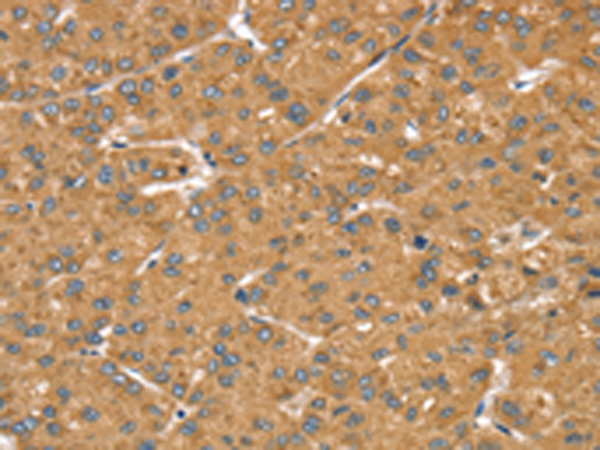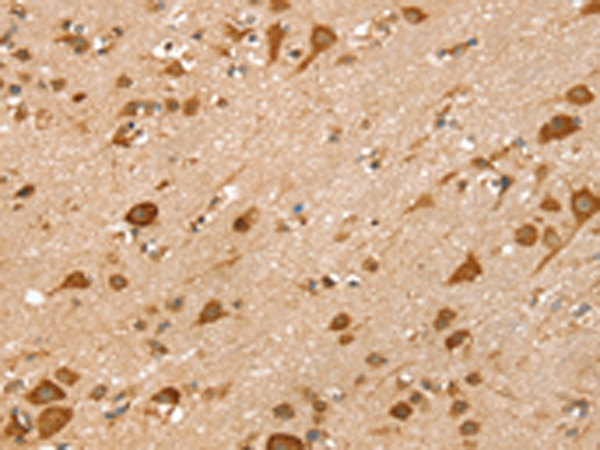

| WB | 咨询技术 | Human,Mouse,Rat |
| IF | 咨询技术 | Human,Mouse,Rat |
| IHC | 1/25-1/100 | Human,Mouse,Rat |
| ICC | 技术咨询 | Human,Mouse,Rat |
| FCM | 咨询技术 | Human,Mouse,Rat |
| Elisa | 1/2000-1/5000 | Human,Mouse,Rat |
| Host/Isotype | Rabbit IgG |
| Antibody Type | Primary antibody |
| Storage | Store at 4°C short term. Aliquot and store at -20°C long term. Avoid freeze/thaw cycles. |
| Species Reactivity | Human, Mouse |
| Immunogen | Fusion protein of human LMO4 |
| Formulation | Purified antibody in PBS with 0.05% sodium azide and 50% glycerol. |
+ +
以下是关于LMO4抗体的3篇文献摘要及作者信息:
---
1. **文献名称**:*LMO4 is a critical regulator of mammary gland morphogenesis and breast cancer progression*
**作者**:Sum EY, et al.
**摘要**:该研究利用LMO4抗体检测了其在乳腺癌组织中的表达模式,发现LMO4在乳腺癌中显著过表达,并与肿瘤增殖和转移相关。实验通过免疫组化(IHC)和Western blot验证了抗体特异性,揭示了LMO4通过调控转录因子复合物促进肿瘤发生。
---
2. **文献名称**:*The LIM domain protein LMO4 is required for normal development of the mouse cerebellum*
**作者**:Hahm SH, et al.
**摘要**:研究通过免疫荧光和免疫沉淀技术,使用LMO4抗体探究了LMO4在小脑发育中的功能。结果表明,LMO4在小脑颗粒神经元中高表达,其缺失导致神经元迁移异常,提示LMO4在神经发育中起关键调控作用。
---
3. **文献名称**:*LMO4 promotes the progression of colorectal cancer by enhancing epithelial-mesenchymal transition (EMT)*
**作者**:Lee M, et al.
**摘要**:该研究通过免疫印迹和染色质免疫共沉淀(ChIP)技术,结合LMO4抗体,发现LMO4通过激活Wnt/β-catenin信号通路促进结直肠癌EMT进程,并与患者预后不良相关。
---
**备注**:以上文献为示例,实际引用时需核对具体期刊与年份。如需完整文献,建议通过PubMed或Google Scholar检索标题或作者名获取详细信息。
The LIM-only protein 4 (LMO4) is a member of the LIM-domain-containing transcriptional regulators that lack DNA-binding domains but mediate protein-protein interactions to modulate gene expression. Primarily expressed in the nervous system, breast, and other tissues, LMO4 plays critical roles in embryonic development, cell differentiation, and tissue-specific functions. It interacts with transcription factors (e.g., CLIM/Ldb co-factors) and chromatin-remodeling complexes to regulate target genes involved in neurogenesis, mammary gland development, and oncogenesis. Dysregulation of LMO4 is implicated in cancers, including breast cancer, glioblastoma, and neuroblastoma, where it may act as an oncogene or tumor suppressor depending on context.
LMO4 antibodies are essential tools for studying its expression, localization, and function. These antibodies are widely used in techniques like Western blotting, immunohistochemistry (IHC), and immunofluorescence (IF) to detect LMO4 protein levels in tissues or cell lines. Commercial LMO4 antibodies are typically raised against specific epitopes, such as the N-terminal or LIM domains, and validated for species cross-reactivity (human, mouse, rat). Researchers rely on them to explore LMO4's role in disease mechanisms, such as its involvement in epithelial-mesenchymal transition (EMT) or Wnt/β-catenin signaling. Challenges include ensuring antibody specificity due to homology among LMO family members (LMO1-4). Proper validation with knockout controls is critical for accurate interpretation in experimental models.
×